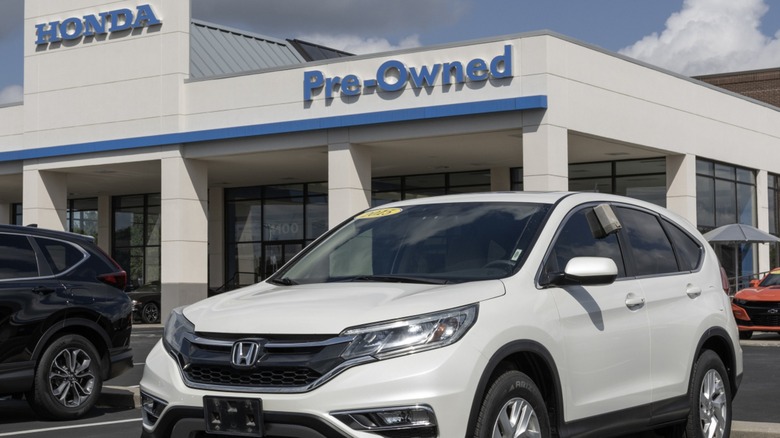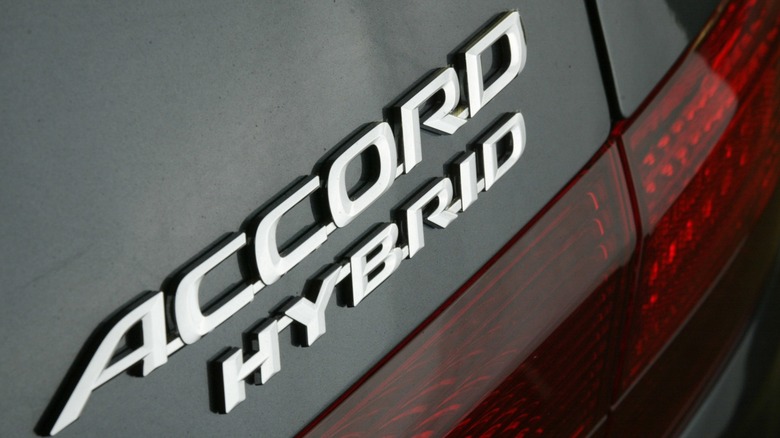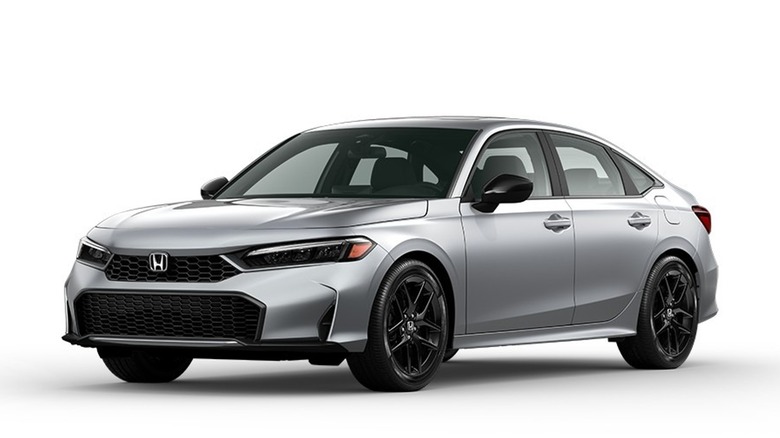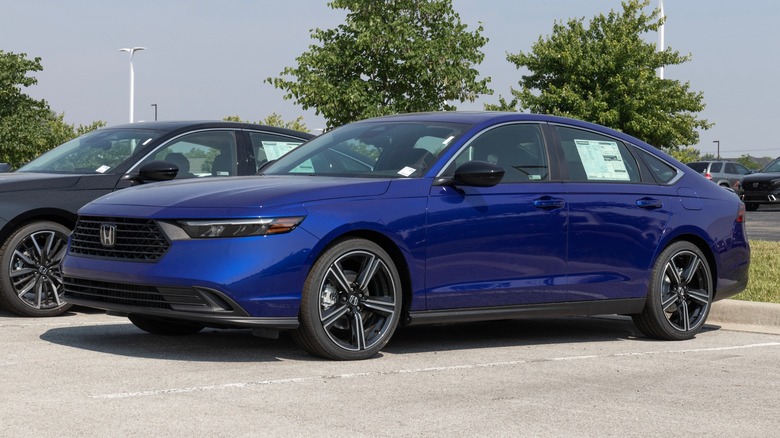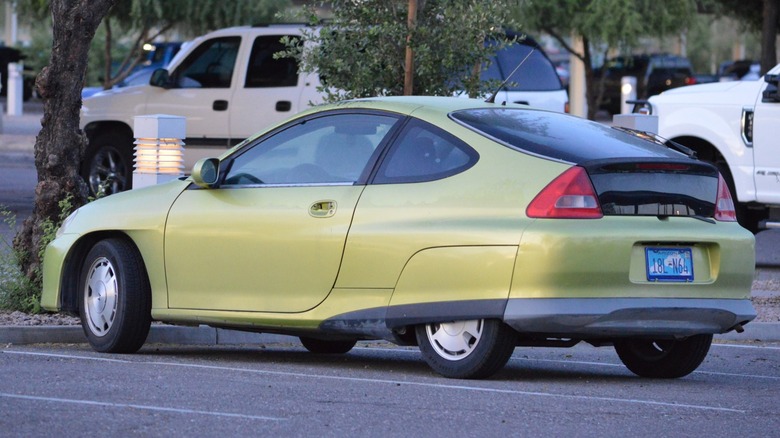6 Things You Should Know Before Buying A Used Honda Hybrid
When shopping for a used but "new-to-you" Honda car or SUV, you may find yourself wondering "Which is better, gas or hybrid?" Honda's lineup of gasoline-powered automobiles offers well-documented fuel economy and reliability. The automaker also offers several of its vehicles with battery electric vehicle (BEV) drivetrains and the 2025 Honda CR-V e:FCEV.
The Honda CR-V e:FCEV is a Fuel Cell Electric Vehicle that uses compressed Hydrogen gas to generate electricity with only pure water as its contribution to the atmosphere. However, with its $50,000 starting MSRP, the e:FCEV isn't likely in the running for anyone shopping for used Honda Hybrid vehicles.
The discussion of price brings us to the first thing you should know before buying a used Honda hybrid. As BEV offerings become more popular, the price has leveled off, putting them on par with gasoline-powered vehicle equivalents. Used Honda Hybrid vehicles, on the other hand, tend to cost more than either BEV or gas vehicles. The reason why they're more expensive brings us to the second thing you should know before buying a used Honda hybrid.
Honda Hybrid vehicles occupy the middle ground between Honda's EV and gasoline-powered vehicles
By middle ground, we're referring to traditional vehicle drivetrains and all-electric versions. One reason they're more expensive is that a Honda Hybrid has a traditional gasoline-powered internal combustion engine under the hood, one or more electric drive motors, and a battery to store electrical power.
Providing both systems in a vehicle increases the price. Plug-in hybrid electric ehicles (PHEV) encountered the same pricing challenges. While both Hybrid Vehicle types offered improved fuel economy and performance thanks to the inclusion of electric-motor-assisted drivelines, they used gas engines to provide longer range driving and less worry about finding places to refuel.
At this point in time, hybrid vehicles seem to have won the battle over PHEV offerings. Possibly because of improved BEV range, sticker price, and availability. While some used Honda Hybrids, like the 2023 Honda Accord Hybrid, allow the vehicle to run entirely on battery-electric for a short time, much like a PHEV, the Hybrid's electric drivetrain is mostly designed to help the gas engine be more efficient.
Honda Hybrids often provide more performance than gas-only versions
By employing electric motor assistance in the drivetrain, Honda Hybrids often produce slightly more hp, however, torque production is the most significant performance benefit. Take the aforementioned 2023 Honda Accord for example.
The turbocharged 1.5-liter gasoline engine provided in the 2023 Accord pushes out 192 hp and an equally uninspiring 192 lb-ft of torque. The Accord Hybrid's drivetrain features a naturally aspirated 2.0-liter four-cylinder gas engine paired with two electric motors to produce 204 hp, a modest increase, and 247 lb-ft of torque, a respectable gain over the non-hybrid version.
The 2025 Honda Civic offers gas-only and hybrid versions with a similar performance disparity between them. Either version comes with a 2.0-liter four-cylinder engine. The gas-only version has 150 hp and 133 lb-ft of torque, while the hybrid's "High-Torque Traction Motor" provides 181 hp and 232 lb-ft of torque for a total ISO net system hp of 200.
Used Honda Hybrids get good fuel economy
Honda automobiles are generally known for getting good fuel economy, but opting for the hybrid powertrain version of your favorite Honda will save you money at the gas pump. The front-wheel drive 2023 Honda CR-V Hybrid received an EPA-estimate of 43 mpg in the city, 36 mpg on the highway, and a combined rating of 40 mpg while the AWD version dropped to 40, 34, and 37 mpg respectively.
The EPA-estimated fuel economy for the non-hybrid turbocharged 2023 Honda CR-V with front-wheel drive was 28 mpg city, 34 highway, and 30 combined. The all-wheel drive options dropped city mpg by one and highway mpg by two resulting in a 29-mpg combined estimate. Ultimately, the hybrid is estimated to get between 11 and 13 more miles out of every gallon of gasoline, which equates to a $350 to $400 per year fuel savings, while delivering more torque and horsepower.
Honda has offered a wide range of hybrid vehicles now available on the used market
Honda's initial North American hybrid offering, introduced to U.S. dealerships in 1999, was the Honda Insight. While it only generated a total of 73 horsepower and 91 lb-ft of torque, it received an EPA-estimated 53 mpg combined fuel economy rating.
The Honda Insight is no longer available, being discontinued in favor of other models. Models like the Honda Clarity PHEV, Honda ZR-Z, and Honda Accord PHEV have also fallen by the wayside. The Honda Civic Hybrid could be an excellent choice for a used Honda Hybrid, however, you'll have to find a 10-plus-year-old model or wait for someone to sell their 2025 Civic Hybrid since Honda opted to not produce the Civic Hybrid from 2016 through 2024.
You'll have the best chance, and most options, if you look for used Honda Hybrids from 2023 and 2024. If you're most interested in a car rather than an SUV, the Accord Hybrid is a great option. The Honda CR-V Hybrid from that period is a great option for anyone interested in a used Honda Hybrid SUV.
Owning a used Honda Hybrid could have downsides
It's easy to point out all the benefits of owning a used Honda Hybrid with their increased performance, lofty fuel economy ratings, and lowered greenhouse gas emissions, but we'd be remiss if we didn't mention the potential for the technology's downsides. While most Honda Hybrid maintenance is similar to any other gas-only-powered vehicle, the hybrid's battery is an additional part that could fail.
There are several ways to maintain the health of your hybrid car's battery, some of which are crucial to maintaining any factory or extended warranties. Maintaining the hybrid battery warranty is important since Honda Universe estimates replacement cost could range upwards of $8,000 depending on the model.
There's also an increased risk of fire associated with hybrid vehicles. According to a study by AutoinsuranceEZ hybrid vehicles caught fire at a rate of 3,474.5 per 100,000 hybrids sold compared to 1,529.9 per 100K gas vehicles sold.
The study's findings also revealed that battery issues were the most common causes of hybrid car fires. You should also know that hybrid and EV battery-related fires are more difficult for firefighters to control. Furthermore, many fire departments in areas where EVs are not prevalent lack the training that could make fires such as these more manageable.
